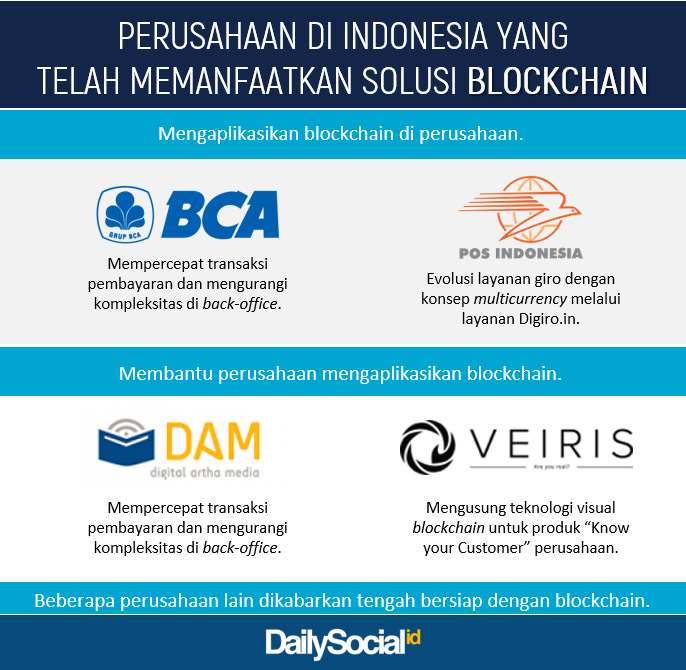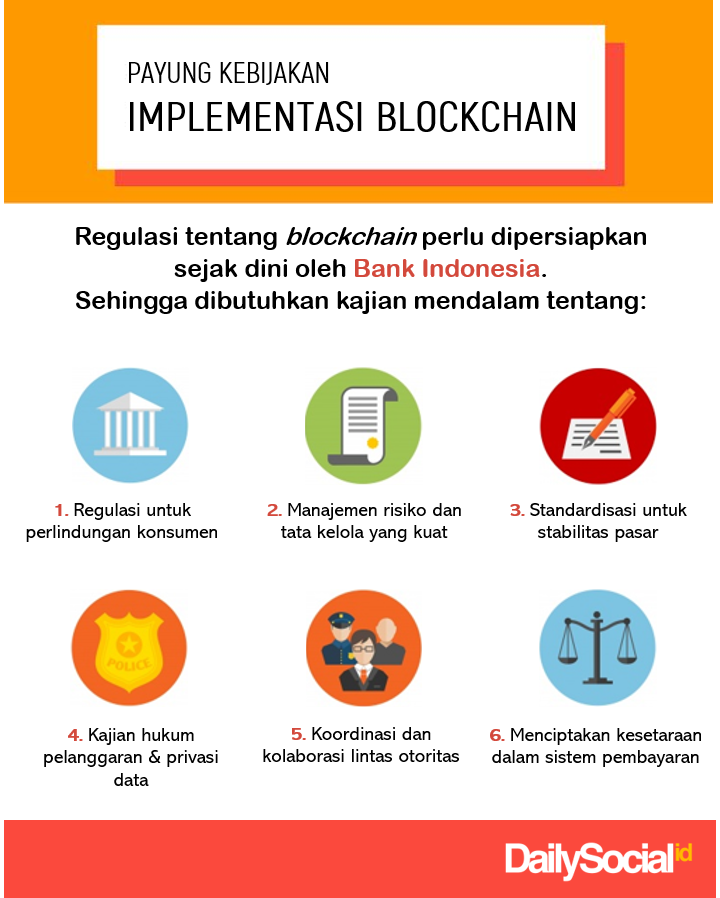Exploring the Potential Utilization of Blockchain in Indonesia
Implementation, case studies and policies
Through a previous article entitled "Get to know Cryptocurrency and its Transaction Mechanism", DailySocial review basic concepts cryptocurrency and how it works blockchain as one of the applications. From these reviews it is concluded that in general blockchain provide several benefits when applied in a business process. First, its decentralized nature can expand financial access because there are no limited intermediaries in the transaction process. This at the same time brings efficiency because there are no time and place limitations in its operations.
Second, creating financial solutions with lower transaction costs – when compared to rates conventional transactions—while still prioritizing transaction security. Currency properties crypto which is composed of a complex algorithm (encrypted) and validated by a network that carries blockchain rated very safe. With these advantages, it is hoped that the banking business will be the most disrupted blockchain, despite the currently limited real application.
According to the Chief Executive Director of the Payment System Policy Department of Bank Indonesia, Eny Panggabean, application blockchain in the public financial sector in Indonesia can be designed into various forms. For example to support cross-border payment services (cross-border payments) and remittances through private blockchains. In addition to those directly referring to financial transactions, Eny also conveyed several other scenarios that could be encouraged through: blockchain, for example recording land ownership, helping with stock trading recapitulation, to recording government bonds.
Ettienne Reinecke, CTO of Dimension Data Group, also provides examples of implementation blockchain which is considered quite visionary with digital developments, namely supporting the Internet of Things (IoT) business. In IoT the platform runs continuously real-time, businesses will generate millions of transactions collected from distributed machines. log will produce a lot. If the system applies a transactional model and must be managed centrally, using middleware as an intermediary, the system is likely to be slow and expensive.
Recognizing risk
Behind its decentralized nature, capital blockchain also present some risk which needs to be considered. based system blockchain classified as very "free", meaning that there is no guarantee of consumer protection as in a centralized process (eg Bank Indonesia as a regulator). All transactions are managed in the public domain, so the privacy of consumer data is also in danger of not being properly maintained. outside the system, blockchain also allow for criminal activity, such as money laundering and financing of terrorist activities – the authorities will find it difficult to properly enforce or control the activities of these transactions.
One of the main tasks of the state in the financial sector is to maintain the stability of the existing system. If blockchain is not regulated, it is likely that a disruption will occur that disrupts the system. The current centralization policy always focuses on monetary policy from the regulations released by Bank Indonesia. For that, if indeed in the future it will be possible to implement it blockchain massively, from now on, many things need to be done, especially for parties with an interest in regulating the monetary system in the country.
The crucial thing that is not done first is the existence of trials and proof of the reliability offered by the company blockchain ain. From there, the government needs to adjust regulations and formulate rules for law enforcement as an umbrella to support the current system, for example to prevent money laundering or corruption activities. Then, there must be strong governance, risk management, and operational standardization, the goal is to avoid market fragmentation. To build a system blockchain In fact, a large investment is also required, so it is necessary to conduct an in-depth study of ROI (Return on Investment) from its implementation.
Application case studies blockchain in Indonesia and the world
Bank Central Asia (BCA) claims that it is currently using technology blockchain for operational activities within the company. The vision of its implementation is to speed up payment transactions, reduce the complexity of transactions in back-office. Besides that, there are Indonesian post, the company developed a system called "Digiro.in", namely the application of blockchain for service multicurrency or more precisely, for the evolution of the current account service, which is one of the business models implemented by POS Indonesia.
There is also Digital Artha Media Corporation (DAM Corp), a company fintech-enabled operating in Indonesia trying to develop solutions white labelblockchain to help companies in the financial sector. The solutions offered are claimed to be able to help companies make the transition from a centralized to decentralized business model. A startup from Singapore has just announced its presence in Indonesia. Named Veiris, the startup carries computer-based visual technology blockchain to help corporations complete the process Know Your Customer to increase engagement with partners.

Abroad, blockchain has also begun to be realized. For example in Canada, the Royal Bank of Canada (RBC) has developed a system based on Distributed Ledger Technology (DLT) named Hyperledger. Its implementation has been applied to assist transactions with bank branches in the United States and Canada. Interestingly, Hyperledger is designed openly, through certain mechanisms banking institutions can connect to it. In Singapore, Bank Oversea-Chinese Banking Corporation (OCBC) apply blockchain to help smooth transactions between Branch offices in Singapore and Malaysia. With this succession, it is claimed to make the transaction process only take a maximum of 5 minutes.
Expert opinion on implementation blockchain
In a discussion opportunity in the session #TuesdayStartup which is held DailySocial, one of the speakers for IBM Indonesia Country Blockchain Leader, Juliandri Jenie, explained more about implementation blockchain in several fields. At the beginning of his presentation he pointed out Spotify's ambition to bring blockchain in the digital music industry. In April 2017, Spotify acquired a startup blockchain called Mediachain Labs. Spotify's goal is to provide a fairer mechanism for calculating and paying royalties for music creators. Superiority blockchain what we want to develop is to track down who wrote the song, the title of the song that was created, and so on, so that royalties can be distributed more precisely too.
For in Indonesia, Janie explained that there are several areas that can be optimized by: blockchain, one of which is in the field of supply chain. Explaining the application, he said:
"Blockchain will be very useful for the company supply chain leaders. Their benefit is increased visibility of logistics information and documentation throughout the supply chain. Other benefits include reducing costs and risks through automation, scalable and secure tracking of physical risks and events in the supply chain, and enabling the creation of new business models."
Towards the end of last year, DailySocial take part in conference blockchain international in Bali. There, several experts conveyed their ideas and findings about the use of blockchain at advanced level. One practitioner blockchain present was CyberMiles Chief Scientist Michael Yuan. In his presentation he explained how business E-commerce can be helped by technology blockchain, for example to provide efficiencies in identity management, including helping to realize product tracking and authenticity systems, because all data can be stored in blockchain and synced to all networks. Such a solution is considered to be able to revolutionize business and technology again E-commerce.
According to Matej Michalko, CEO of Decent, at the same conference, blockchain considered to be a solution to a chronic problem that haunts the content industry, namely piracy. With system blockchain, creators can easily sell and distribute content to content audiences directly with a mechanism called "data exchange". Imagine if a content can be distributed with encryption and a unique identity for each viewer. When an unauthorized distribution occurs, tracking it will be easier or even impossible because of the encryption system applied.
Bank Indonesia as regulator
As a preventive measure, Indonesia needs to immediately develop a standard policy regarding blockchain. The development is not visible, but if you look at the previous technology trends that have developed very quickly, Bank Indonesia is a key component here.
First, in relation to consumer protection, it is necessary to create a solution for complaints, handling, or transparency in every business process that is implemented.

Bank Indonesia also needs to be trigger cross-authority collaboration, including building partnerships with international parties considering the scope blockchain not limited to one country. To prevent negative impacts in the implementation of the payment system, it is necessary to have provisions to ensure equality in the payment system applied. Last but not least, Bank Indonesia needs to be the determinant of the priority scale. Technology may advance while still taking into account the development, stability, and integrity of the country's economy.
According to the presentation of Bank Indonesia in an opportunity, it takes two years to complete the review process for the issuance of digital money, which will more or less be completed in 2020. It seems regulation blockchain will be a part of it.
Enthusiasm blockchain in Indonesia as an early stage synergy
Following developments blockchain in the world and in Indonesia, six companies blockchain local companies (Blocktech Indonesia, Blockchain Zoo, IndoDAX, Indonesian Blockchain Network, Luno, and Pundi X) established Indonesian Blockchain Association.
Chaired by IndoDAX CEO Oscar Darmawan, the association brings a number of visions. One of them is to encourage collaboration between policy makers and business actors who will use blockchain and cryptocurrency as a technology foundation.
As a first step, the association has also become part of the Indonesian Chamber of Commerce (KADIN) to jointly formulate a development alignment program blockchain with regulations in Indonesia.
Sign up for our
newsletter
